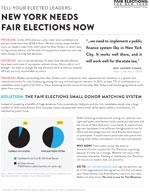Problem: In the 2012 election cycle, state-level candidates and parties raised more than $108 million.1 All that money sways the decisions our leaders make from what’s best for New Yorkers to what’s best for big money donors, and the lack of transparency means we can’t see when money is driving bad decisions.
Problem: Just in the last decade, 15 state-level elected officials have been convicted of corruption-related crimes. Ethics reform isn’t enough—we need to change the way elections work so that our elected officials are truly accountable to voters.
Problem: Middle and working class New Yorkers can’t compete for their representatives’ attention in a system that rewards politicians for only fundraising among the very rich and special interests. In 2012, at least 71% of contributions to candidates came in gifts of $1,000 or more, drowning out the voices of everyday New Yorkers and discouraging diverse candidates from running.
Solution: The Fair Elections Small Donor Matching System
Instead of accepting a handful of huge donations from corporations, lobbyists and the rich, candidates would raise a large number of small contributions from everyday voters, because each time a small-dollar donor makes a contribution, it’s matched by public funds.
Public financing combined with strong non-partisan oversight and lower contribution limits, would put elections and the future of New York back in our hands. It would encourage new candidates from different backgrounds to run for office and encourage new and more diverse small donors to participate. It would reward politicians who spend time raising small-dollar contributions from their constituents.
Why Now? From voters across the state to Governor Cuomo, support for Fair Elections is growing because it’s time for a change. Whether the issue is the economy, education, fracking or healthcare, Fair Elections will ensure our leaders hear our priorities.

